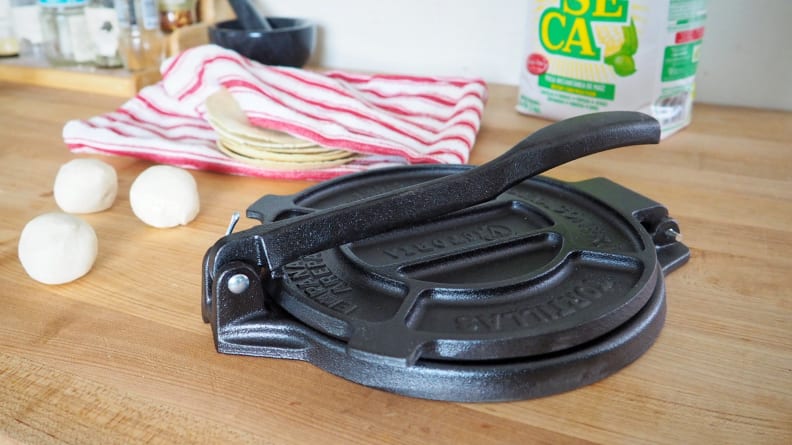The Best Tortilla Presses of 2020

Updated March 12, 2019
It shouldn’t surprise you that a good taco requires a great tortilla. After all, it has so few ingredients you have to make each one count! Since there are dozens of options at the grocery store, you might wonder why it’s worth the bother to make tortillas from scratch at home. I’ll let you in on a little secret: If you’re equipped with the right tools, making corn tortillas is almost easier than driving to the store to buy them. All you need is a specialty flour called masa harina and a decent tortilla press—like our best tested, the Victoria 8-Inch Cast Iron Tortilla Press (available at Amazon) .
Related content

best-right-now

feature
Making homemade corn tortillas is an instant way to up your taco game, but you’ll have to decide on a tortilla press before you can get there. There are more than a few options, from lightweight aluminum and heavy-duty cast-iron to beautifully hand-crafted wood presses. Does the press material make a difference in the end result of the tortilla? After testing six top-rated tortilla presses, we can confirm that opting for a good quality press absolutely makes a difference.
Here are the best tortilla presses we tested ranked, in order.
Victoria 8-Inch Cast Iron Tortilla Press Central Coast Woodworks 8-Inch Hardwood Tortilla Press (Red Oak & Walnut) La Mexicana Mesquite Tortilla Press HIC 6-Inch Tortilla Press Imusa 8-Inch Aluminum Tortilla Press Norpro 6-Inch tortilla maker
Recommendations are independently chosen by Reviewed’s editors. Purchases you make through our links may earn us a commission.
Victoria 8" Cast Iron Tortilla Press
How We Tested (and How to Make Corn Tortillas)
What You Should Know About Tortilla Presses
Other Tortilla Presses We Tested
More Articles You Might Enjoy


The best tortilla maker is the Victoria 8-inch Cast Iron Tortilla Press.
The Victoria 8-Inch Cast Iron Tortilla Press is heavy—it weighs more than 8 pounds—but that heft comes in handy when pressing tortillas. This tortilla press not only stayed put on the counter as we used it, but the weight of the pressing surfaces barely required any effort to transform a round dough ball into a thin, even tortilla. The tortillas were so perfectly flat and consistent that I would happily serve them in a restaurant to paying customers. We also liked that the pressing plates were large enough to prevent the dough from spilling out of the sides if you didn't happen to center the dough perfectly in the middle.
While cast iron isn’t the easiest material to clean, pressing the tortilla in between two pieces of plastic wrap eliminated the need for any messy cleanup. Simply wipe the press clean with a damp towel and rub it dry to prevent rusting. And unlike some of the other heavy presses, the Victoria was low-profile enough to store in a cabinet or drawer without any fuss. Add in the fact that it was so effortless to use and that it pressed tortillas faster than the other models—only 10 seconds per tortilla—and it was a no-brainer to name the Victoria our Best Tortilla Press.
How We Tested (and How to Make Corn Tortillas)

Some of the presses did a better job at creating perfectly flat, even tortillas.
Hi, I’m Lindsay Mattison, a trained professional chef and a life-long taco fan. I could eat tacos for breakfast, lunch, and dinner (and, I have on more than one occasions). After a visit to San Antonio, Texas, I became obsessed with recreating the corn tortillas I ate there. It turns out it's super easy to do, and I'd love to help you learn how!
While you can use a tortilla press for rolling out homemade dumpling skins and making empanadas, our tests focused around the one thing the press is designed to do: making corn tortillas. We wanted to know if the material made a difference in the pressing process, both in the effort required to flatten the dough and the final quality of the tortilla itself.
We started by making a standard corn tortilla dough. After mixing 2 cups of masa harina with 1/2 teaspoon salt and 1-1/2 cups warm water, we divided and rolled each portion into 1-ounce balls (which, in case you’re wondering, makes about 19 tortillas). Since tortilla presses aren’t designed to be non-stick, we lined each press with a plastic bag cut in half. Then, we flattened five tortillas in each press before cooking them on a preheated cast iron skillet, flipping them every 30 seconds for two minutes.
With each press, we noted the amount of force required to flatten the dough ball, and whether it created a 6-inch tortilla after the first pressing. We also measured the thickness of each tortilla and assessed whether it was even all the way around. The press lost points if the tortilla was thinner on one side or if the dough spilled out of the side of the press as we used it. Then, we tasted the tortillas to see if we could detect any thick, uncooked pockets or if the edges crisped up because they were pressed too thin. While all of the presses successfully flattened the dough into discs, some of them certainly did a better job than others.
Related content

best-right-now

feature
What You Should Know About Tortilla Presses

Tortilla presses come in all different shapes and sizes!
It’s important to note that tortilla presses are for corn tortillas only. Flour tortillas are best rolled with a rolling pin, as the gluten network starts to shrink up as soon as it leaves the press.
A tortilla press is simply two flat surfaces joined together by a handle. When the press is closed, the handle exerts pressure onto the plates, transforming a round dough ball into a flat disc. These presses can be made from anything, but traditional Mexican presses are made with wood. The wooden models are rarely round, and their bulk can make them awkward and cumbersome to use. Cast iron is a great alternative, with the same heft of wood but a significantly smaller profile. You’ll also find aluminum and plastic presses, which are lightweight but require more force to use.
There are also electric models designed to cook and press the tortillas in one fell swoop. We’ve found that these gadgets rarely create restaurant-quality tortillas as they’re also designed to make everything from flatbreads to pancakes. So, we focused on the manual models and cooked each tortilla on a pre-heated cast-iron skillet.
0 коммент.:
Отправить комментарий